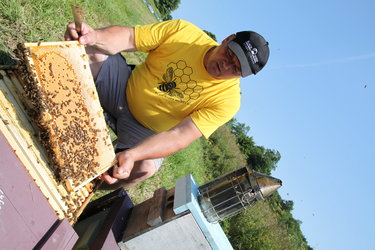Next year, over-the-counter neonic products will come off store shelves
As bird and insect populations plummet, pesticides that can harm bees and other pollinators are being limited by the state.
The state’s Department of Environmental Conservation is reclassifying certain products containing the neonicotinoid (neonic) insecticides imidacloprid, thiamethoxam, and acetamiprid as “restricted use” to ensure applications are limited to trained pesticide applicators in specific situations.
Restricting the use of these pesticides enables the DEC to collect new data to determine where, when, and how they are used, as well as their potential impacts.
“Over the last decade, neonics have come under increasing scrutiny because of their impacts on pollinators — but new evidence demonstrates that these chemicals are harming an even wider range of wildlife,” said Erin McGrath, policy manager for Audubon New York, in a release from the DEC. “Exposure to neonics can prevent songbirds from orienting themselves for their migration, cause significant weight loss, and interfere with their reproductive success.”
“Reclassifying these pesticides will ensure they are only used in targeted instances by qualified professional applicators, and only available for sale to certified applicators which will further protect public health and the environment,” said Commissioner Basil Seggos in the release.
New York’s Pollinator Protection Plan notes that pollinators contribute substantially to the state’s environment and economy. According to the United States Department of Agriculture, pollinators provide approximately $344 million worth of pollination services to New York and add $29 billion in value to crop production nationally each year. The state’s ability to produce crops such as apples, grapes, cherries, onions, pumpkins, and cauliflower relies heavily on pollinators.
Pesticides represent one of many factors that stress pollinators, and neonicotinoids in particular have been identified as a group of pesticides that, in general, are highly toxic to pollinators. While commercial application of all pesticides is reported to DEC as part of the state’s regulatory oversight, residential applications and sales of general-use products to consumers are not.
The reclassification will ensure proper use by trained applicators and enables DEC to collect sales and use data to estimate and monitor the quantities and locations where these products are used.
The reclassification will take effect on Jan. 1, 2023, allowing time for registrants, distributors, and retailers to prepare for the change in classification.
Neonics will be reclassified under DEC’s pesticide regulation authority and pesticide registrants have been notified of the intent to reclassify the applicable products. Products labeled for “limited directed application” to tree trunks and the ground at the base of trees, shrubs, and plants are not included in the reclassification. These products provide cost-effective and unique pest control for residential applications, particularly for invasive species, and limit potential exposure to pollinators.
“Getting ‘over-the-counter’ neonic products off of store shelves marks an important first step in reining in widespread neonic contamination, which we see in New York State’s water and in record yearly losses of bees,” said Dan Raichel, acting director of Natural Resources Defense Council’s Pollinator Initiative in the release. “We look forward to continued work with the DEC on even more protections for people and pollinators from these neurotoxic pesticides.”



